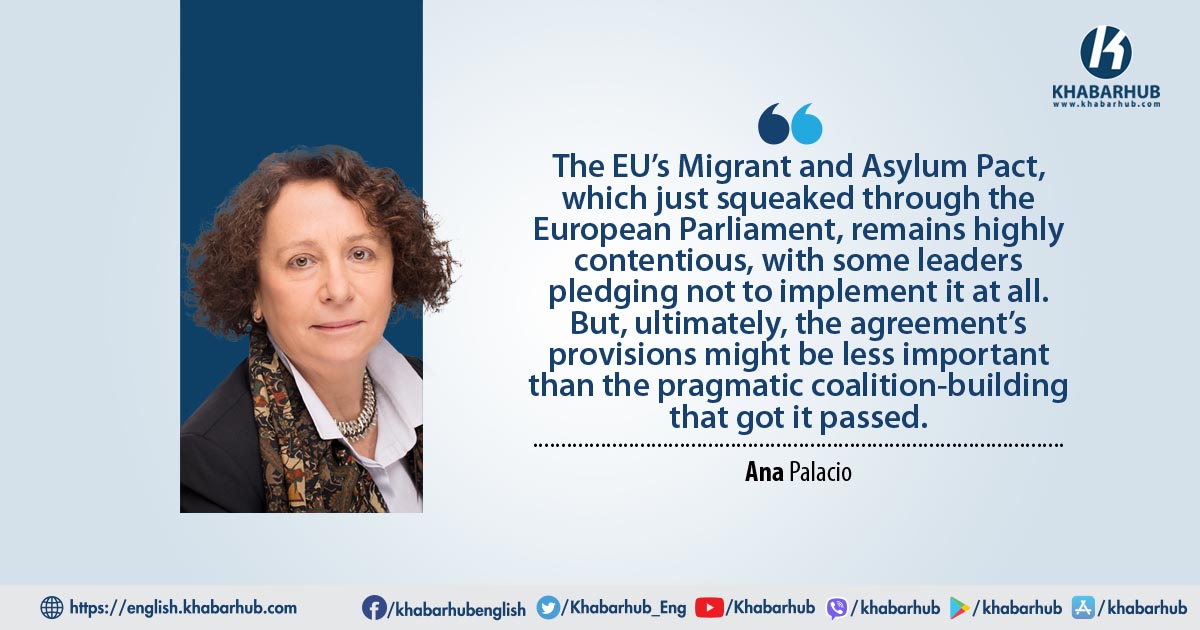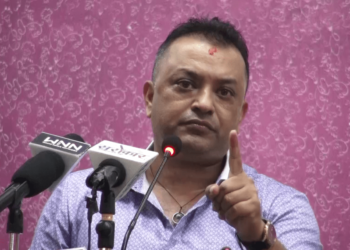Amid escalating geopolitical tensions, and with European Parliament elections looming, the narrow passage earlier this month of the European Union’s Migrant and Asylum Pact has attracted relatively little attention.
To be sure, the agreement is more remarkable for the mere fact of its enactment than for any of the provisions it contains.
Nonetheless, it marks the culmination of a decade-long effort to reform the EU’s “Dublin system” for governing migration-related matters.
The need for change was undoubtedly urgent. In the last year alone, some 380,000 people crossed the EU’s borders without authorization – the highest number since 2016 – and a record 1.14 million sought asylum.
The major “arrival countries” – such as Greece, Italy, and Spain – have long advocated for a fairer distribution of asylum-seekers across the EU.
But consensus on the topic has been elusive, owing to divergent interests and priorities among EU member states.
That has not changed. The Migrant and Asylum Pact rests on a delicate trade-off: frontline states agreed to establish detention centers to process asylum-seekers’ claims and repatriate individuals deemed ineligible, and their EU counterparts would either accept a share of the rest or participate in cost-sharing initiatives.
Far-right parties say it is insufficient to deter migrants, whereas left-leaning groups and NGOs worry that it does too little to protect migrants’ rights and ensure adequate living conditions.
For a large share of Europe’s political leaders, however, this is not good enough.
In fact, the Pact barely passed. While it won the support of the three principal parliamentary factions – the center-right European People’s Party (EPP), the Progressive Alliance of Socialists and Democrats, and the liberal Renew Europe – a significant number of MEPs abstained, effectively expressing their dissent.
The effort to push through the Migrant and Asylum Pact highlighted the complex political dynamics shaping the EU’s approach to migration. Both Italy’s Socialists and their ideological foils from the Five Star Movement voted against parts of the bill, motivated largely by their interest in opposing Prime Minister Giorgia Meloni – a key proponent of the deal. Similar dynamics played out in France.
The process also exposed new political divisions. Representatives of Germany’s Greens, for example, broke ranks with their counterparts at home to vote against the package.
The Pact is now set to be endorsed by the Council of the European Union on April 29. But it still faces opposition from both ends of the political spectrum.
When it comes to migration policy, the EU is at a crossroads. It has largely abandoned the “Wir schaffen das” (“We’ll manage this”) spirit embodied by former German Chancellor Angela Merkel in 2015, when she decided to allow over a million asylum-seekers to enter Germany.
Far-right parties say it is insufficient to deter migrants, whereas left-leaning groups and NGOs worry that it does too little to protect migrants’ rights and ensure adequate living conditions.
Polish Prime Minister Donald Tusk has announced that Poland will not accept the relocation mechanism, while Slovakia’s populist prime minister, Robert Fico, has declared that he will not implement the new rules at all.
Even so, the Migrant and Asylum Pact may hold positive lessons about EU politics and the Union’s future.
Most notably, the effort to pass it demonstrated the impact a leader like Meloni can have when they bring to bear their coalition-building capabilities.
Contrary to her combative campaigning style, Meloni has adopted a pragmatic and constructive approach to European leadership, particularly when it comes to migration.
For example, she was a principal architect of the Memorandum of Understanding that the European Commission and Tunisia signed last July.
Though the MoU has been the target of much-deserved criticism – it is no blueprint for engagement with third countries – it established Meloni as a major voice in Europe’s migration debate.
Meloni has also been a driving force behind other bilateral deals, such as a recent aid deal with Egypt aimed at curbing irregular migration to the EU.
In marshaling support for the Migrant and Asylum Pact, Meloni collaborated with the European Commission, and carried out more than 20 high-profile missions in the Mediterranean over an eight-month period.
But the EU must find a way forward. To that end, the next European Parliament – which is certain to feature more fragmentation – must embrace the Meloni model of creative coalition-building, underpinned by pragmatism and a commitment to shared values.
Ultimately, the Migrant and Asylum Pact hints at an emerging approach to EU-level policymaking: imperfect consensus.
Although no one is entirely satisfied, the EU does not remain deadlocked. Some progress, however limited, is preferable to inaction.
In this sense, the fate of the migration agreement will serve as a kind of barometer for the next European Parliament’s mandate.
When it comes to migration policy, the EU is at a crossroads. It has largely abandoned the “Wir schaffen das” (“We’ll manage this”) spirit embodied by former German Chancellor Angela Merkel in 2015, when she decided to allow over a million asylum-seekers to enter Germany.
The idea of forcing asylum-seekers to settle outside the EU’s borders is gaining traction, as reflected in the EPP manifesto for the June elections.
Despite the broad appeal of limiting migration, however, the EU also needs migrants to fill crucial low-skill jobs – such as in construction – for which there is an acute shortage of workers.
Finding consensus on the right balance between these two imperatives would be difficult in the best of times; at a moment of deep polarization, it is practically impossible.
But the EU must find a way forward. To that end, the next European Parliament – which is certain to feature more fragmentation – must embrace the Meloni model of creative coalition-building, underpinned by pragmatism and a commitment to shared values.
(Ana Palacio, a former minister of foreign affairs of Spain and former senior vice president and general counsel of the World Bank Group, is a visiting lecturer at Georgetown University)
Copyright: Project Syndicate









Comment